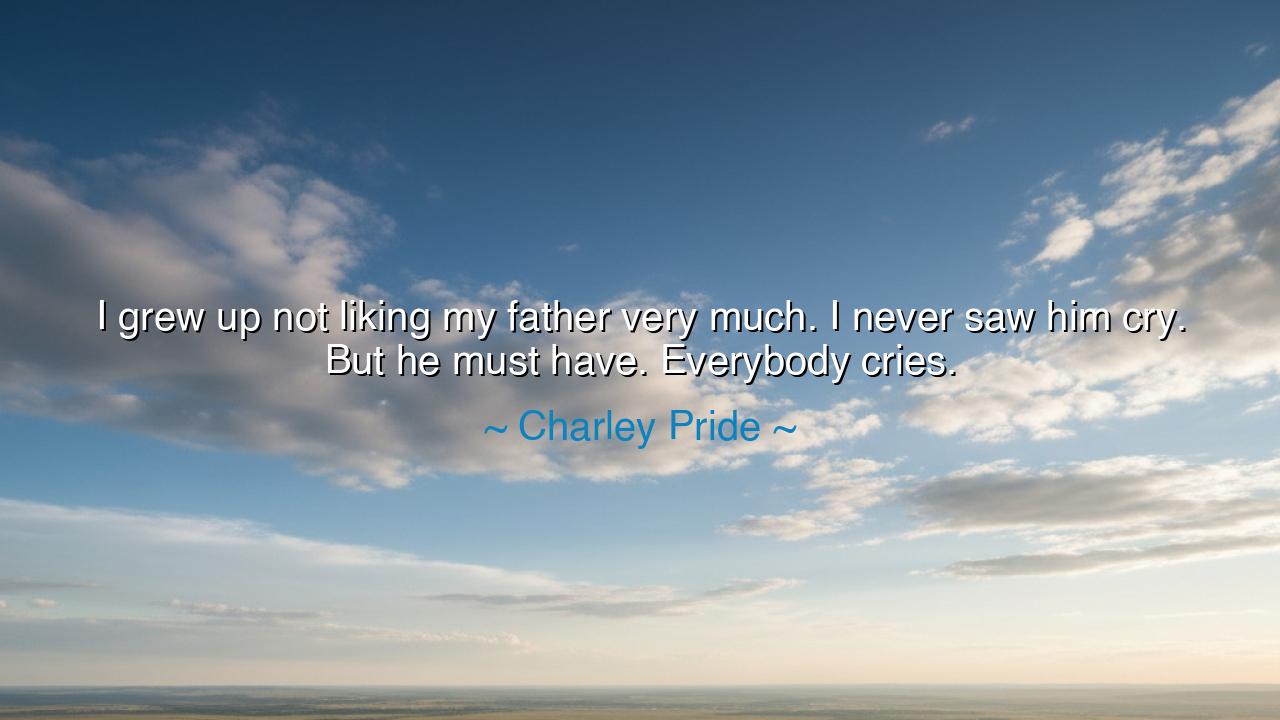
I grew up not liking my father very much. I never saw him cry.
I grew up not liking my father very much. I never saw him cry. But he must have. Everybody cries.






The words of Charley Pride—“I grew up not liking my father very much. I never saw him cry. But he must have. Everybody cries”—are a confession not only of memory, but of understanding born from time and tenderness. In these few sentences, the country singer, once a boy hardened by misunderstanding, speaks as a man who has come to know the hidden sorrows of fathers. His statement, simple yet profound, reveals the mystery of love concealed by strength, the quiet ache of generations who expressed devotion not through tears, but through endurance. It is a meditation on what it means to be human, to feel deeply yet remain silent, and to learn, at last, that even the stoic heart bleeds unseen.
To grasp the meaning of these words, one must see through the eyes of both child and parent. As a child, Pride looked upon his father’s reserve—the absence of tears, the hardness of voice—and mistook it for coldness. The young mind, yearning for warmth, cannot yet read the language of silence. But as years pass, experience teaches what innocence cannot grasp: that love takes many forms, and that pain, when borne quietly, may be no less profound than when spoken. “He must have cried,” Pride admits—not because he ever saw it, but because now he understands that to live is to grieve, and to love is to suffer. Thus, what once seemed indifference reveals itself as human frailty cloaked in pride, a frailty universal to all who carry burdens they dare not show.
In the ancient way, such a reflection would be counted among the teachings of wisdom—the moment when understanding transforms bitterness into compassion. The Greeks would have called it anagnorisis, the recognition of truth through sorrow. Many sons throughout the ages have spoken these words, if not aloud, then within their hearts. They are the words of the soul when it awakens to see the humanity of its elders—the realization that the figures once seen as towering and cold were, in truth, fragile beings themselves, battling storms of their own. Pride’s words thus bridge the eternal chasm between father and son, between misunderstanding and mercy.
History offers many echoes of this truth. Consider Marcus Aurelius, emperor and philosopher, who ruled Rome with reason yet rarely showed tenderness. To his son Commodus, he seemed a distant and exacting father, a man of iron discipline. Yet in the pages of Meditations, written not for the world but for himself, Marcus reveals his heart—his doubts, his fears, his prayers for wisdom. The emperor who never wept before his son wept in his writings. And centuries later, when those words reached the eyes of others, they unveiled what the child could not see: that even kings have tears, though they fall in private.
So too did Charley Pride, born the son of a poor sharecropper in the South, come to see that his father’s silence was not born of cruelty, but of a world that taught men that strength meant suppression. In his father’s time, men labored through hardship without complaint, believing that to show sorrow was to falter. Yet beneath the stoicism burned the same fire that burns in all hearts—the longing to love and to be loved, the ache of worry for family, the private grief of dreams unfulfilled. Pride’s reflection—“Everybody cries”—is his final reconciliation with that truth. It is both an apology and a benediction: forgiveness offered through understanding.
The lesson within these words is as eternal as it is tender: judge not the hearts you do not yet understand. We are all shaped by our times, our struggles, our fears. The father who never cried before his son may have wept into his pillow; the mother who seemed stern may have trembled in secret for her child’s safety. Life teaches us to look beyond appearances, to listen for the unspoken, and to honor the hidden humanity in others. Compassion, born of experience, is the crown of maturity.
And so, dear listener, take this wisdom into your heart: do not wait until years have passed to see the heart behind another’s silence. Seek to understand now. Speak the words of love you may later wish you had said. Remember that even the strongest souls—those who seem unshakable—bear wounds unseen. Everybody cries, whether their tears fall in solitude or in the open light. To recognize this is to see the divine thread that binds all people together—the shared frailty that makes us not lesser, but more beautiful.
Thus, the voice of Charley Pride becomes not merely a memory of his father, but a message for all generations: that strength without tenderness is incomplete, and love without understanding is blind. Learn to see the hidden tears in others, and you will learn to forgive, to connect, and to heal. For in the end, it is not the absence of tears that defines strength, but the quiet courage to feel deeply and still go on loving in a world that so often misunderstands.






AAdministratorAdministrator
Welcome, honored guests. Please leave a comment, we will respond soon